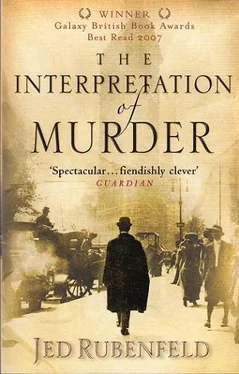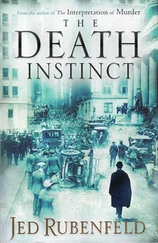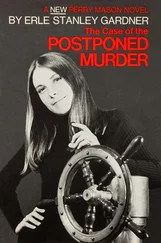Jed Rubenfeld - The Interpretation of Murder
Здесь есть возможность читать онлайн «Jed Rubenfeld - The Interpretation of Murder» весь текст электронной книги совершенно бесплатно (целиком полную версию без сокращений). В некоторых случаях можно слушать аудио, скачать через торрент в формате fb2 и присутствует краткое содержание. Жанр: Исторические приключения, на английском языке. Описание произведения, (предисловие) а так же отзывы посетителей доступны на портале библиотеки ЛибКат.
- Название:The Interpretation of Murder
- Автор:
- Жанр:
- Год:неизвестен
- ISBN:нет данных
- Рейтинг книги:5 / 5. Голосов: 1
-
Избранное:Добавить в избранное
- Отзывы:
-
Ваша оценка:
- 100
- 1
- 2
- 3
- 4
- 5
The Interpretation of Murder: краткое содержание, описание и аннотация
Предлагаем к чтению аннотацию, описание, краткое содержание или предисловие (зависит от того, что написал сам автор книги «The Interpretation of Murder»). Если вы не нашли необходимую информацию о книге — напишите в комментариях, мы постараемся отыскать её.
The Interpretation of Murder — читать онлайн бесплатно полную книгу (весь текст) целиком
Ниже представлен текст книги, разбитый по страницам. Система сохранения места последней прочитанной страницы, позволяет с удобством читать онлайн бесплатно книгу «The Interpretation of Murder», без необходимости каждый раз заново искать на чём Вы остановились. Поставьте закладку, и сможете в любой момент перейти на страницу, на которой закончили чтение.
Интервал:
Закладка:
'So much gold,' he said admiringly to the ladies: in the high ceding above us, heavenly plaster scenes were lined with gold leaf. 'It reminds me of our Operahaz, by Ybl, in Budapest. Have you been?'
Neither of the two ladies had. Indeed, they professed confusion. Hadn't Ferenczi just told them he came from Hungary?
'Yes, yes,' said Ferenczi. 'Oh, look at that little cherub in the corner, with the tiny grapes hanging out of his little mouth. Isn't he adorable?'
Freud was engrossed in conversation with James Hyslop, retired professor of logic at Columbia, who sported an ear trumpet the size of the horn on a Victrola talking machine. Jelliffe had attached himself to Charles Loomis Dana, the eminent neurologist and, unlike our host, a member of the same circles as my Aunt Mamie. In Boston, the Danas are royalty: Sons of Liberty, intimates of the Adamses, and so on. I knew one of Dana's distant cousins, a Miss Draper, from Newport, where she had more than once brought down the house with her impersonation of an old Jewish tailor. Jelliffe reminded me of a glad- handing senator. He had a look of high self-worth, carrying his impressive girth as if corpulence were next to manliness.
Jelliffe pulled me into his group, whom he was regaling with stories about his famous client, Harry Thaw, apparently living like a king in the hospital where he was confined. Jelliffe went so far as to say he would trade places with Thaw at the drop of a hat. What I drew from these remarks was that Jelliffe relished the celebrity of being Thaw's psychiatrist. 'Can you imagine?' he added. 'A year ago he had us all attesting to his insanity, to clear him of murder. Now he wants us to swear to his sanity to get him out of the asylum! And we shall get him out!'
Jelliffe roared with laughter, his arm around Dana's shoulder. Several of his listeners joined in; Dana decidedly did not. About a dozen guests, all told, were scattered about the room, but I understood that one more was expected. Soon enough, a butler opened the doors and preceded a woman into the room.
'Mrs Clara Banwell,' he announced.
'Can you psychoanalyze anyone, Dr Freud?' asked Mrs Banwell, as the party entered Jelliffe's dining room. 'Can you psychoanalyze me?'
On certain social occasions, otherwise dignified and serious men will begin behaving unconsciously like players on a stage, performing as they talk, acting as they gesticulate. The cause is invariably a woman; Clara Banwell produced that effect on Jelliffe's male guests. She was twenty- six, her skin the white of a powdered Japanese princess. Everything about her was perfectly formed. Her shape was exquisite. Her hair was forest-dark, her eyes sea-green, with the luster of a fine provoking intelligence. An iridescent Oriental pearl hung from each ear, and a single large pink conch pearl, encased in a basket of diamonds and platinum, hung below her neck on a silver thread. When she hinted at a smile — and she never more than hinted — men fell at her feet.
In 1909, the guests at a fashionable American dinner made a pairwise procession when called to table, every woman escorted on the arm of a man. Mrs Banwell was not on Freud's arm. She had lightly dropped her fingers on Younger's wrist at the decisive moment, but still she managed to address herself to Freud, while capturing the attention of the entire party as she did so.
Only that morning, Clara Banwell had returned to town from the country, in the same car with Mr and Mrs Harcourt Acton. Jelliffe had run into her in the lobby of their building quite by accident. The moment he learned that her husband, Mr George Banwell, was to be otherwise engaged, he begged Clara to attend his dinner that evening. He assured her she would find the guests most interesting. Jelliffe found Clara Banwell utterly irresistible — and her husband equally unbearable.
'What women want,' Freud replied to her question, as the guests took their seats at a table shimmering with crystal, 'is a mystery, as much to the analyst as to the poet. If only you could tell us, Mrs Banwell, but you cannot. You are the problem, but you are no better able to solve it than are we poor men. Now, what men want is almost always apparent. Our host, for example, instead of his spoon, has picked up his knife by mistake.'
All heads turned to the smiling, bulky form of Jelliffe at the head of the table. It was so: he had his knife — not his bread knife, but his dinner knife — in his right hand. 'What does that signify, Dr Freud?' asked an elderly lady.
'It signifies that Mrs Banwell has aroused our host's aggressive impulses,' said Freud. 'This aggression, arising from circumstances of sexual competition readily comprehensible to everyone, led his hand to the wrong instrument, revealing wishes of which he himself was unconscious.'
There was a murmur around the table.
'A touch, a touch, I do confess it,' cried Jelliffe with unembarrassed good spirits, wagging his knife in Clara's direction, 'except of course when he says that the wishes in question were unconscious.' His civilized scandalousness elicited a burst of appreciative laughter all around.
'By contrast,' Freud went on, 'my good friend Ferenczi here is fastidiously securing his napkin to his collar, as a bib is tucked into a child. He is appealing to your maternal instinct, Mrs Banwell.'
Ferenczi looked about the table with good-natured perplexity: only then did he notice that he was alone in this particular use of his dinner napkin.
'You conversed at length with my husband before dinner, Dr Freud,' said Mrs Hyslop, a grandmotherly woman seated next to Jelliffe. 'What did you learn about him?'
'Professor Hyslop,' replied Freud, 'will you confirm something for me, sir? You did not mention to me your mother's first name, did you?'
'What's that?' said Hyslop, holding his ear trumpet high.
'We didn't speak of your mother, did we?' asked Freud.
'Speak of Mother?' repeated Hyslop. 'Not at all.'
'Her name was Mary,' said Freud.
'How did you know that?' cried Hyslop. He looked accusingly around the table. 'How did he know that? I didn't tell him Mother's name.'
'You certainly did,' said Freud, 'without knowing it. The puzzle to me is your wife's name. Jelliffe tells me it is Alva. I confess I had predicted a variant of Mary. I felt quite certain of it. Thus I have a question for you, Mrs Hyslop, if you will permit me. Does your husband by any chance have a pet name by which he calls you?'
'Why, my middle name is Maria,' said a surprised Mrs Hyslop, 'and he has always called me Marie.'
At this admission, Jelliffe let out a whoop, and Freud received a round of applause.
'I woke up with a catarrh this morning,' interjected a matron across from Ferenczi. 'At the end of summer, too. Does that mean anything, Dr Freud?'
'A catarrh, madam?' Freud paused to consider. 'Sometimes a catarrh, I'm afraid, is only a catarrh.'
'But are women really so mysterious?' Clara Banwell resumed. 'I think you are being much too forgiving of my sex. What women want is the simplest thing in the world.' She turned to the exceedingly good-looking, dark-haired young man on her right, whose white bow tie was just slightly askew. He had said nothing so far. 'What do you think, Dr Younger? Can you tell us what a woman wants?'
Stratham Younger was having difficulty taking Clara Banwell's measure. Although he did not know it, he was laboring to put out of his mind a recurrent image of Mrs Banwell's lovely bare back, undulating gently in the moonlight as she tossed her hair over her shoulder. He was also having trouble separating the idea of Mrs George Banwell from that of Mr George Banwell, whom Younger could not stop thinking of as a murderer, despite the mayor's exculpation of him.
Younger believed that Nora was the loveliest girl he had ever seen. Yet Clara Banwell was quite nearly as attractive, if not more so. Desire in man, says Hegel, always begins with a desire for the other's desire. It was impossible for any man to look on Clara Banwell without wanting her to single him out, favor him, want something from him. Jelliffe, for example, would gladly have dived on a sword if Clara had only seen fit to grace him with a request to do so. On their way into the dining room, when Clara's hand had rested on his arm, Younger had felt the contact throughout his person. Yet there was something about her that distanced him too. Perhaps it was his having met Harcourt Acton. Younger did not consider himself a puritan, but the idea of Mrs Banwell gratifying so weak-looking a man insensibly provoked him.
Читать дальшеИнтервал:
Закладка:
Похожие книги на «The Interpretation of Murder»
Представляем Вашему вниманию похожие книги на «The Interpretation of Murder» списком для выбора. Мы отобрали схожую по названию и смыслу литературу в надежде предоставить читателям больше вариантов отыскать новые, интересные, ещё непрочитанные произведения.
Обсуждение, отзывы о книге «The Interpretation of Murder» и просто собственные мнения читателей. Оставьте ваши комментарии, напишите, что Вы думаете о произведении, его смысле или главных героях. Укажите что конкретно понравилось, а что нет, и почему Вы так считаете.












